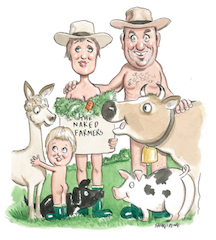http://www.onlineopinion.com.au/view.asp?article=14659
Two days before Christmas I had to make a horrible decision and asked my husband to finally shoot my horse. She had cancer. I would have done anything to keep my friend here with me, and over the past 3 months she has received many a ‘stay of execution’ as I imagined improvements, however slight.
But eventually it was obvious that she was in pain. I couldn’t bear that. Burying a horse is a huge endeavour, requiring a big hole. That means earthmoving equipment which we can’t afford at the moment. And I don’t think I could have borne putting her in the ground and then having the weight of it on top of her. The only other option is burning. I have always been a believer in cremation and so this felt right for me.
The morning after the fateful night, I went to say my goodbyes. She had chosen to lie down at the foot of a lovely rainforest tree which had coated the ground in pink flowers and as she lay during the night, more had fallen on her. She wasn’t there, but that body that I love so much was. I cut off some of her mane and tail for jewellery in remembrance of her and finally drove away and told my husband it was his turn to go and do what he had to do. He felled a long dead tree, split it, and built the most beautiful pyre. Burning a body requires a very hot fire but I was surprised how small it seemed to be. As in life, Baby was beautiful to the bitter end. The fire burned hot, bright and with cascades of shooting golden sparks – like champagne. She was glad to be free.
Over the Christmas week I fed the fire every day, determined that there would be nothing left. I had to rake bones back into the fire and while my heart was breaking it felt good to do something really practical and it was very grounded. After all, we will all die one day.
In my grief and pain, and amidst the practicalities, I mused on which is better – burn or bury?
And I learned things perhaps we don’t need to know. As I strove to burn all the bones I googled cremation process and learned that no cremation is hot enough to destroy all the bones, and that in all commercial cremations something called a crepusculator is used to grind the remains into the fine ash we associate with cremated remains. All death is final, but it seems that cremation is more so. Once they are gone, they’re gone. There can be no imagining of their whole and perfect body which burial allows us. With burial in those airtight boxes we can imagine our beloved sleeping peacefully underground. Still whole. That is very reassuring. Although I have fought the urge in the past to dig up a dog a few days after burial just to hold him once more.
Burial gives us a place to mourn and grieve, a place to speak and imagine we are heard. A place to go to share this enormous burden of grief. I had never understood the roadside grave markers but now I see that the exact spot where someone has died holds enormous significance for us. As if some part of their soul still remains there. I had always thought that burial binds us to the earth as if our souls can’t fly free once entombed. Now I see we are always held here in the hearts and minds of those who have loved us.
It is easier to imagine our loved ones soaring free on the breeze after cremation because they are no more, and have abandoned their earthly body. But maybe in all death, no matter how we dispose of the remains, the journey for those left behind is in coming to terms with the irreversible nature of their loss. Never to touch, never to hold, never to stroke again. My hands almost hurt with the need to touch her.
The glade where she lived out her last months and finally died is where I see her still and where I go to howl out my pain. Grief is so raw, ragged and furious. So primitive. Now I understand Aboriginal and African wailing for the dead. But in pristine, crowded, cemeteries how can modern Australians allow themselves to be prostrate with grief and to rage at the heavens and howl out their pain? Do we allow space and room for grief in modern society? It’s a long process. A lonely journey. In our denial of death and our seeking to reman ‘forever young’ have we forgotten how to honour death and the pain of those left behind. We don’t talk about it, we like to gloss over it, we won’t dwell on it. But surely only in full exploration of our emotions are we able to set both our beloved and ourselves free and to carry on.
Life is for the living but we carry the dead with us in our hearts. As city cemeteries become fuller and land price prime, don’t we need to have a conversation with the living that we love about what will happen when we die? A living will, a prosaic appreciation of the inevitability of our own demise. And to have this discussion in our own homes, weighing up whether our bodies are better burned or buried and where we want our earthly remains to lie.
